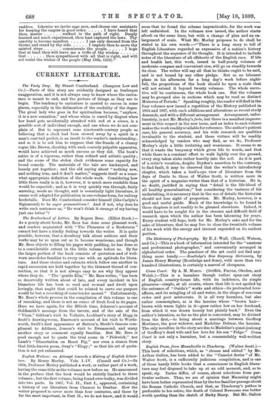English Writers : an Attempt towards a History of English.
Litera- ture. By Henry Morley. Vols. I.-IV. (Cassell and Co.)—In 1864, Professor Morley published a work, or rather part of a work, having the same title as the volumes now before us. He announced in the preface that the book would be strictly limited to three volumes ; but the first volume, being found over-bulky, was divided into two parts. In 1867, Vol. II., Part I., appeared, containing a history of our literature from Chaucer to Dunbar. How the writer proposed to cover more than four centuries, and these by far the most important, in Part II., we do not know, and it would seem that he found the scheme impracticable, for the work was left nnfinished. In the volumes now issued, the author starts afresh on the same lines, but with a change of plan and an en- largement of scale. What Mr. Morley proposes to do shall be stated in his own words :—"There is a long story to tell of English Literature regarded as expressive of a nation's history throughout the sequence of its thought. It is intended to include notes of the literature of all offshoots of the English race. If life and health last, this work, issued in half-yearly volumes of moderate compass and convenient size, will go on steadily towards its close. The writer will say all that he thinks ought to be said, and is not bound by any other pledge. But as no labourer plans in his afternoon for a long day's work before night- fall, the proportions of the book should be upon a scale that will not extend it beyond twenty volumes. The whole narra- tive will be continuous, the whole book one. But the volumes may be grouped also in sections which may be read as distinct Histories of Periods." Speaking roughly, the reader will find lathe four volumes now issued a repetition of the History published in 1864 and 1867, with such additions and alterations as recent study demands, and with a different arrangement. Arrangement, unfor- tunately, is not Mr. Morley's forte, but there is a manifest improve- ment in this respect in the new issue, and an index to each volume makes the work readily available for reference. The author's patient care, his general accuracy, and his wide research are qualities invaluable to the student, and these virtues will be readily acknowledged by readers who may find, as we do, Professor Morley's style a little irritating and wearisome. It seems to us that it wants the buoyancy which gives life to words, and that while there is a constant effort to walk lightly over the ground, every step taken sinks rather heavily into the soil. As it is part of a critic's vocation, despite Dryden's assertion to the contrary, to find fault, it may be observed that the writer's introductory chapter, which takes a bird's-eye view of literature from the days of Dante to those of Walter Scott, is written more in the spirit of a magazine writer than that of a historian. He is, no doubt, justified in saying that "detail is the life-blood of all healthy generalisation ;" but considering the vastness of his undertaking, it is necessary that in the use of details the historian should not lose sight of proportion. Mr. Morley, however, is a good and useful guide. Much of the knowledge to be found in these chapters is not readily to be gleaned elsewhere. Indeed, it would have to be sought for in the obscure and difficult field of research upon which the author has been labouring for years. Every student will hope, both for Mr. Morley's sake and for the sake of literature, that he may live to close the twentieth volume of his work with the energy and interest expended on its earliest portion.


































 Previous page
Previous page